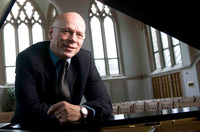Jeremy S. Begbie
More books by Jeremy S. Begbie…
“Not so long ago a psychiatrist told me that one of the marks of an adult who has never properly grown up is an inability to wait, and a whole therapeutic movement has been built on that one insight alone. Because music takes or demands our time and depends on carefully timed relations between notes, it cannot be rushed. It schools us in the art of patience. Certainly we can play or sing a piece of music faster. But we can do this only to a very limited degree before the piece becomes incoherent. Given today’s technology we can cut and paste, we can hop from track to track on the MP3 player, flip from one song to another, and download highlights of a three-hour opera. But few would claim they hear a piece of music in its integrity that way. Music says to us: “There are things you will learn only by passing through this process, by being caught up in this series of relations and transformations.”34 Music requires my time, my flesh, and my blood for its performance and enjoyment, and this means going at its speed. Simone Weil described music as “time that one wants neither to arrest nor hasten.”35 In an interview, speaking of the tendency of our culture to think that music is there simply to “wash over” us, the composer James MacMillan remarked: “[Music] needs us to sacrifice something of ourselves to meet it, and it’s very difficult sometimes to do that, especially [in] the whole culture we’re in. Sacrifice and self-sacrifice—certainly sacrificing your time—is not valued any more.”36”
― Resounding Truth: Christian Wisdom in the World of Music
― Resounding Truth: Christian Wisdom in the World of Music
“The vision is rather of the artist, as physical and embodied, set in the midst of a God-given world vibrant with a dynamic beauty of its own, not simply "there" like a brute fact to be escaped or violently abused but there as a gift from a God of overflowing beauty, a gift for us to interact with vigorously, shape and reshape, form and transform, and in this way fashion something as consistent and dazzlingly novel as the Goldberg Variations, art that can anticipate the beauty previewed and promised in Jesus Christ.”
―
―
“Just as the Triune God lives as an endless momentum of attraction and joy, so God makes himself available not as an object for dispassionate scrutiny but through an overture of enticement, through which by the Spirit's agency we are made to long for God's presence, indeed, thirst for God. God "attracts our attention" by the outgoing Spirit, enabling us to respond, catching us up into the divine life. Indeed, can we not say that to experience the allure of God is nothing other than to experience the Spirit reconciling us to the Father through the Son and thus reordering our desires? No wedge need be driven between agape and eros provided the latter is not allowed to introduce notions of subsuming the "other" under manipulative restraint; indeed, as David Bentley Hart puts it, God's love, and hence the love with which we come to love God, is "eros and agape at once: a desire for the other that delights in the distance of otherness." As far as created beauty is concerned, beauty in the world that glorifies this God will also evoke desire--a yearning to explore and take pleasure in whatever is beautiful. There need be no shame in this provided our delight is delight in the other as other, and as long as we regularly recall that our love for God is the cantus firmus that enables all other desires to flourish.”
― A Peculiar Orthodoxy: Reflections on Theology and the Arts
― A Peculiar Orthodoxy: Reflections on Theology and the Arts
Is this you? Let us know. If not, help out and invite Jeremy to Goodreads.







































